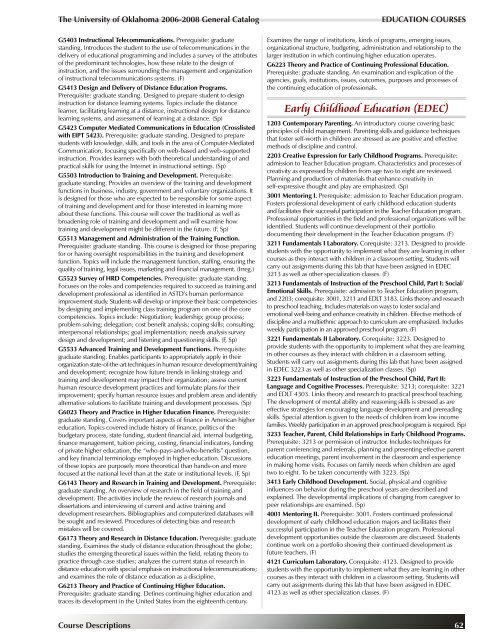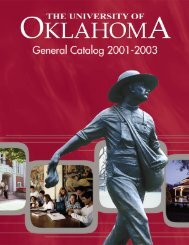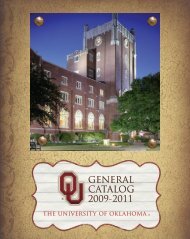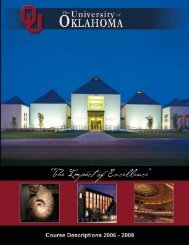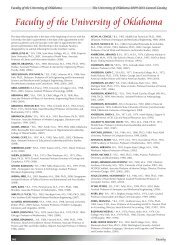ART - Catalog - University of Oklahoma
ART - Catalog - University of Oklahoma
ART - Catalog - University of Oklahoma
You also want an ePaper? Increase the reach of your titles
YUMPU automatically turns print PDFs into web optimized ePapers that Google loves.
The Uni ver sity <strong>of</strong> <strong>Oklahoma</strong> 2006-2008 Gen eral Cat a log<br />
EDUCATION COURSES<br />
G5403 Instructional Telecommunications. Prerequisite: graduate<br />
standing. Introduces the student to the use <strong>of</strong> telecommunications in the<br />
delivery <strong>of</strong> educational programming and includes a survey <strong>of</strong> the attributes<br />
<strong>of</strong> the predominant technologies, how these relate to the design <strong>of</strong><br />
instruction, and the issues surrounding the management and organization<br />
<strong>of</strong> instructional telecommunications systems. (F)<br />
G5413 Design and Delivery <strong>of</strong> Distance Education Programs.<br />
Prerequisite: graduate standing. Designed to prepare student to design<br />
instruction for distance learning systems. Topics include the distance<br />
learner, facilitating learning at a distance, instructional design for distance<br />
learning systems, and assessment <strong>of</strong> learning at a distance. (Sp)<br />
G5423 Computer Mediated Communications in Education (Crosslisted<br />
with EIPT 5423). Prerequisite: graduate standing. Designed to prepare<br />
students with knowledge, skills, and tools in the area <strong>of</strong> Computer-Mediated<br />
Communication, focusing specifically on web-based and web-supported<br />
instruction. Provides learners with both theoretical understanding <strong>of</strong> and<br />
practical skills for using the Internet in instructional settings. (Sp)<br />
G5503 Introduction to Training and Development. Prerequisite:<br />
graduate standing. Provides an overview <strong>of</strong> the training and development<br />
functions in business, industry, government and voluntary organizations. It<br />
is designed for those who are expected to be responsible for some aspect<br />
<strong>of</strong> training and development and for those interested in learning more<br />
about these functions. This course will cover the traditional as well as<br />
broadening role <strong>of</strong> training and development and will examine how<br />
training and development might be different in the future. (F, Sp)<br />
G5513 Management and Administration <strong>of</strong> the Training Function.<br />
Prerequisite: graduate standing. This course is designed for those preparing<br />
for or having oversight responsibilities in the training and development<br />
function. Topics will include the management function, staffing, ensuring the<br />
quality <strong>of</strong> training, legal issues, marketing and financial management. (Irreg.)<br />
G5523 Survey <strong>of</strong> HRD Competencies. Prerequisite: graduate standing.<br />
Focuses on the roles and competencies required to succeed as training and<br />
development pr<strong>of</strong>essional as identified in ASTD’s human performance<br />
improvement study. Students will develop or improve their basic competencies<br />
by designing and implementing class training program on one <strong>of</strong> the core<br />
competencies. Topics include: Negotiation; leadership; group process;<br />
problem solving; delegation; cost benefit analysis; coping skills; consulting;<br />
interpersonal relationships; goal implementation; needs analysis survey<br />
design and development; and listening and questioning skills. (F, Sp)<br />
G5533 Advanced Training and Development Functions. Prerequisite:<br />
graduate standing. Enables participants to appropriately apply in their<br />
organization state-<strong>of</strong>-the-art techniques in human resource development/training<br />
and development; recognize how future trends in linking strategy and<br />
training and development may impact their organization; assess current<br />
human resource development practices and formulate plans for their<br />
improvement; specify human resource issues and problem areas and identify<br />
alternative solutions to facilitate training and development processes. (Sp)<br />
G6023 Theory and Practice in Higher Education Finance. Prerequisite:<br />
graduate standing. Covers important aspects <strong>of</strong> finance in American higher<br />
education. Topics covered include history <strong>of</strong> finance, politics <strong>of</strong> the<br />
budgetary process, state funding, student financial aid, internal budgeting,<br />
finance management, tuition pricing, costing, financial indicators, funding<br />
<strong>of</strong> private higher education, the “who-pays-and-who-benefits” question,<br />
and key financial terminology employed in higher education. Discussions<br />
<strong>of</strong> these topics are purposely more theoretical than hands-on and more<br />
focused at the national level than at the state or institutional levels. (F, Sp)<br />
G6143 Theory and Research in Training and Development. Prerequisite:<br />
graduate standing. An overview <strong>of</strong> research in the field <strong>of</strong> training and<br />
development. The activities include the review <strong>of</strong> research journals and<br />
dissertations and interviewing <strong>of</strong> current and active training and<br />
development researchers. Bibliographies and computerized databases will<br />
be sought and reviewed. Procedures <strong>of</strong> detecting bias and research<br />
mistakes will be covered.<br />
G6173 Theory and Research in Distance Education. Prerequisite: graduate<br />
standing. Examines the study <strong>of</strong> distance education throughout the globe;<br />
studies the emerging theoretical issues within the field, relating theory to<br />
practice through case studies; analyzes the current status <strong>of</strong> research in<br />
distance education with special emphasis on instructional telecommunications;<br />
and examines the role <strong>of</strong> distance education as a discipline.<br />
G6213 Theory and Practice <strong>of</strong> Continuing Higher Education.<br />
Prerequisite: graduate standing. Defines continuing higher education and<br />
traces its development in the United States from the eighteenth century.<br />
Examines the range <strong>of</strong> institutions, kinds <strong>of</strong> programs, emerging issues,<br />
organizational structure, budgeting, administration and relationship to the<br />
larger institution in which continuing higher education operates.<br />
G6223 Theory and Practice <strong>of</strong> Continuing Pr<strong>of</strong>essional Education.<br />
Prerequisite: graduate standing. An examination and explication <strong>of</strong> the<br />
agencies, goals, institutions, issues, outcomes, purposes and processes <strong>of</strong><br />
the continuing education <strong>of</strong> pr<strong>of</strong>essionals.<br />
Early Childhood Education (EDEC)<br />
1203 Contemporary Parenting. An introductory course covering basic<br />
principles <strong>of</strong> child management. Parenting skills and guidance techniques<br />
that foster self-worth in children are stressed as are positive and effective<br />
methods <strong>of</strong> discipline and control.<br />
2203 Creative Expression for Early Childhood Programs. Prerequisite:<br />
admission to Teacher Education program. Characteristics and processes <strong>of</strong><br />
creativity as expressed by children from age two to eight are reviewed.<br />
Planning and production <strong>of</strong> materials that enhance creativity in<br />
self-expressive thought and play are emphasized. (Sp)<br />
3001 Mentoring I. Prerequisite: admission to Teacher Education program.<br />
Fosters pr<strong>of</strong>essional development <strong>of</strong> early childhood education students<br />
and facilitates their successful participation in the Teacher Education program.<br />
Pr<strong>of</strong>essional opportunities in the field and pr<strong>of</strong>essional organizations will be<br />
identified. Students will continue development <strong>of</strong> their portfolio<br />
documenting their development in the Teacher Education program. (F)<br />
3211 Fundamentals I Laboratory. Corequisite: 3213. Designed to provide<br />
students with the opportunity to implement what they are learning in other<br />
courses as they interact with children in a classroom setting. Students will<br />
carry out assignments during this lab that have been assigned in EDEC<br />
3213 as well as other specialization classes. (F)<br />
3213 Fundamentals <strong>of</strong> Instruction <strong>of</strong> the Preschool Child, Part I: Social/<br />
Emotional Skills. Prerequisite: admission to Teacher Education program,<br />
and 2203; corequisite: 3001, 3211 and EDLT 3183. Links theory and research<br />
to preschool teaching. Includes materials on ways to foster social and<br />
emotional well-being and enhance creativity in children. Effective methods <strong>of</strong><br />
discipline and a multiethnic approach to curriculum are emphasized. Includes<br />
weekly participation in an approved preschool program. (F)<br />
3221 Fundamentals II Laboratory. Corequisite: 3223. Designed to<br />
provide students with the opportunity to implement what they are learning<br />
in other courses as they interact with children in a classroom setting.<br />
Students will carry out assignments during this lab that have been assigned<br />
in EDEC 3223 as well as other specialization classes. (Sp)<br />
3223 Fundamentals <strong>of</strong> Instruction <strong>of</strong> the Preschool Child, Part II:<br />
Language and Cognitive Processes. Prerequisite: 3213; corequisite: 3221<br />
and EDLT 4303. Links theory and research to practical preschool teaching.<br />
The development <strong>of</strong> mental ability and reasoning skills is stressed as are<br />
effective strategies for encouraging language development and prereading<br />
skills. Special attention is given to the needs <strong>of</strong> children from low income<br />
families. Weekly participation in an approved preschool program is required. (Sp)<br />
3233 Teacher, Parent, Child Relationships in Early Childhood Programs.<br />
Prerequisite: 3213 or permission <strong>of</strong> instructor. Includes techniques for<br />
parent conferencing and referrals, planning and presenting effective parent<br />
education meetings, parent involvement in the classroom and experience<br />
in making home visits. Focuses on family needs when children are aged<br />
two to eight. To be taken concurrently with 3223. (Sp)<br />
3413 Early Childhood Development. Social, physical and cognitive<br />
influences on behavior during the preschool years are described and<br />
explained. The developmental implications <strong>of</strong> changing from caregiver to<br />
peer relationships are examined. (Sp)<br />
4001 Mentoring II. Prerequisite: 3001. Fosters continued pr<strong>of</strong>essional<br />
development <strong>of</strong> early childhood education majors and facilitates their<br />
successful participation in the Teacher Education program. Pr<strong>of</strong>essional<br />
development opportunities outside the classroom are discussed. Students<br />
continue work on a portfolio showing their continued development as<br />
future teachers. (F)<br />
4121 Curriculum Laboratory. Corequisite: 4123. Designed to provide<br />
students with the opportunity to implement what they are learning in other<br />
courses as they interact with children in a classroom setting. Students will<br />
carry out assignments during this lab that have been assigned in EDEC<br />
4123 as well as other specialization classes. (F)<br />
Course Descriptions 62


